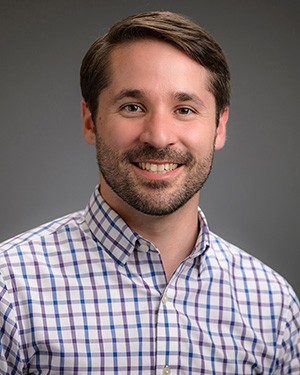Scott Dietrich, PhD, Receives Prestigious CAREER Grant from National Science Foundation

VILLANOVA, Pa. – Scott Dietrich, PhD, an assistant professor of Physics in Villanova University’s College of Liberal Arts and Sciences, has received a five-year, $594,000 Faculty Early Career Development (CAREER) Program award from the National Science Foundation (NSF).
Dr. Dietrich, an expert in nanoelectronics—the use of nanotechnology in electronic components—will investigate the collective behavior of electrons by using microwave radiation to characterize new electronic phases and properties, the discovery of which can ultimately lead to the development of new technologies.
“This grant will enable us to address fundamental questions at the frontiers of highly interacting electronic systems in materials that will advance the field of quantum electronics,” Dr. Dietrich said.
Since 2017, seven Villanova faculty members have received NSF CAREER Awards, the most prestigious award supporting career-development activities for teacher-scholars who most effectively integrate research and education within the context of the mission of their organization. In addition to Dr. Dietrich, Joseph Toscano, PhD (assistant professor of Psychological and Brain Sciences),Troy Shirangi, PhD (assistant professor of Biology), Wenqing Xu, PhD (assistant professor of Civil and Environmental Engineering), Jacob Elmer, PhD (assistant professor of Chemical Engineering), Janette Herbers, PhD (assistant professor of Psychological and Brain Sciences) and Edward Kim, PhD (former assistant professor, Computing Sciences) have been recipients of CAREER awards.
Dr. Dietrich’s project, titled “Microwave Transmission Spectroscopy of Van Der Walls Materials,” will involve Villanova STEM undergraduate and graduate researchers in every aspect of the research. The research team will measure the properties of fragile electronic states in highly interacting electronic systems. Dr. Dietrich and his students will use microwave transmission spectroscopy to study collective electronic states in van der Waals materials at low temperatures and high magnetic fields by coupling microwave radiation to the two-dimensional electron system through an adjacent coplanar waveguide.
The project will include the design and introduction of a new interdisciplinary nanofabrication course that will bring together Villanova Physics and Engineering students in one classroom and laboratory.
In addition, the grant will support educational outreach focusing on K-12 students in the Greater Philadelphia area through partnerships with local libraries as well as with public and private schools. “We plan to hold events that will expose K-12 students to hands-on STEM activities that are directly related to our project’s research areas of nanotechnology, electronics, cryogenics, and quantum mechanics,” Dr. Dietrich said.
Dr. Dietrich received his doctorate in Physics from City University of New York.
About Villanova University’s College of Liberal Arts and Sciences: Since its founding in 1842, Villanova University’s College of Liberal Arts and Sciences has cultivated knowledge, understanding and intellectual courage for a purposeful life in a challenging and changing world. With more than 40 majors across the humanities, social sciences and natural sciences, it is the oldest and largest of Villanova’s colleges, serving more than 4,500 undergraduate and graduate students each year. The College is committed to a teacher-scholar model, offering outstanding undergraduate and graduate research opportunities and a rigorous core curriculum that prepares students to become critical thinkers, strong communicators and ethical leaders with a truly global perspective.
About Villanova University: Since 1842, Villanova University’s Augustinian Catholic intellectual tradition has been the cornerstone of an academic community in which students learn to think critically, act compassionately and succeed while serving others. There are more than 10,000 undergraduate, graduate and law students in the University's six colleges—the College of Liberal Arts and Sciences, the Villanova School of Business, the College of Engineering, the M. Louise Fitzpatrick College of Nursing, the College of Professional Studies and the Villanova University Charles Widger School of Law. Ranked among the nation’s top universities, Villanova supports its students’ intellectual growth and prepares them to become ethical leaders who create positive change everywhere life takes them. For more, visit www.villanova.edu.
